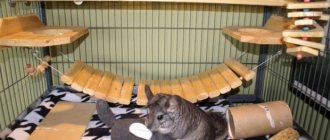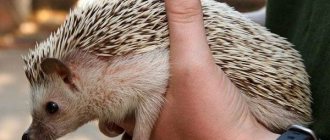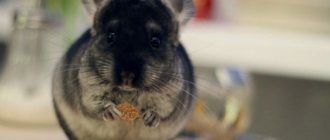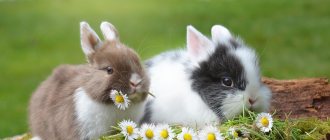When choosing a pet, many people in recent years have paid attention to chinchillas. Many people are attracted by the fact that these rodents do not require too much care, live long enough and have good health. But is it worth keeping a chinchilla at home?
You cannot have a chinchilla and not bear any responsibility for it. In order to decide whether to get a chinchilla, you need to understand all the intricacies of keeping them at home. Let's look at the pros and cons of keeping a chinchilla at home.
Features of chinchillas
Chinchillas are medium-sized rodents with beautiful thick fur and a bushy tail.
The color of the coat is gray with a white belly. They also come in black, snow white, white and pink and beige. The maximum weight of an adult chinchilla is 800-900 g, and the height of the animal can reach 30-38 cm. The tail length is 12-17 cm.
Chinchillas have large, slightly rounded ears, which can always be used to determine their mood. If he is scared, his ears lie flat on his back and are in the same position when he sleeps. And if the chinchilla listens and shows interest, its ears are raised high.
These exotic rodents have very beautiful shiny black eyes in which you can see your reflection. In addition, chinchillas have strong and massive hind legs, which allows them to easily push off the ground while running. They are longer than the front legs.
Character, behavior and habits of a rodent
Chinchillas are intelligent animals that adapt well to a home environment. They are very curious, show interest in their surroundings and do not neglect any changes in the cage or room.
If there are guests in the house, they react very actively, trying to attract attention to their person. They also make interesting sounds that help you understand how the animal is feeling. For example, if a chinchilla is unhappy with something, it makes a cracking sound.
Other features of chinchilla behavior, habits and character:
- They are very energetic and may jump around a lot in the cage, demanding to be released;
- nocturnal, sleep most of the day;
- They quickly become attached to their owners, but do not like to be petted and prefer to be watched from the side;
- they tolerate loneliness very well.
A characteristic feature of chinchillas is also their cleanliness. They always keep their fur clean and never stink. The owner should encourage the animal to do this habit and clean the cage regularly.
Where is it better to have a chinchilla in an apartment or in a house?
The home environment is an important factor to consider before adopting a chinchilla. There is no fundamental difference between a private house and an apartment. This type of pet does not need to be walked, so if you can allocate enough space for a cage or display, it will work well.
It is more important to choose a suitable case. Remember that the chinchilla is a nocturnal animal: it sleeps most of the time during the day, but becomes active at dusk. Placing the cage in your bedroom is a bad idea because it will prevent you from sleeping. It will be uncomfortable in the kitchen or living room due to the noise of household appliances and conversations.
Chinchillas are very sensitive to temperature changes. For example, overheating (above 22°C) can lead to heatstroke and death. Therefore, it is important to control the values both in summer (have air conditioning) and in winter (control the heating system).
Residents of apartments in multi-storey buildings should take this into account, since in many buildings housing and communal services are responsible for this, and balancing the numbers using personal equipment can be problematic. To avoid putting your pet in danger, make sure the environment is suitable before purchasing a chinchilla.
Mini-farm registration
At the initial stage, there is no need to officially register a chinchilla business, since it will take about six months to raise the first litter, from which several individuals can be sold.
Before implementation, you need to choose one of the registration options:
- Individual entrepreneur. Suitable for a single business owner.
- Farming. Relatives can participate in the enterprise, but for this it is necessary to draw up an agreement.
To pay taxes, it is most profitable to choose a single agricultural tax at a rate of 6% of profit.
No license or other permits are required to raise chinchillas. It is necessary to register with the veterinary service.
What does it take to get a chinchilla?
The opinion that keeping a chinchilla requires a lot of money is based precisely on the location of its home.
A chinchilla is less active than a cat or dog.
Such an exotic rodent requires a lot of money. To begin with, you will need to buy the required items such as:
- cage - from 5 thousand rubles;
- house - 500-700 rubles ..;
Don't buy a cage that is too cheap and too small - chinchillas need space. Better to buy a display case. It is much more expensive, from 15 thousand rubles, but it will last longer, and your pet will be more comfortable in it.
Equipped place for chinchillas
- drinking bowls - 200-500 rubles;
- bowl - 100-350 rub.
- swim - 700-1500 rubles;
In addition to startup costs, it's a good idea to take care of monthly supplies. It is important to provide rodents with a nutritious and varied diet whenever possible. And all sorts of wooden accessories will not only provide an interesting variety of leisure time for the animal, but will also help him scrape his teeth:
- Sand (change every 1-3 months) - 200-500 rubles;
- granules (1 kg of main feed) - 400-500 rubles.
- Grain, hay and drying - 300-700 rubles;
- filler (1-5 kg of wood or corn) - 200-400 rubles;
- wood and pumice - from 100 rubles.
Buy only quality food. Chinchillas cannot eat sweets, and most modern companies sell cheap but low-quality food. Sometimes it is safer to buy food from breeders.
Additional but recommended items include a carrier (RUB 800-1,500) that can be used for vet visits and as a waterbed, a hanging hammock for relaxation (RUB 600-00) and a trash can (RUB 200-500).
Genetic calculator
Chinchilla genetics is an interesting and rather complex science. A large combination of genes and their combinations, dominant and recessive manifestations can confuse even experienced breeders. Therefore, a special genetic calculator for chinchilla colors was developed. The main genes of the parents are entered into the calculator: white, beige, sapphire, ebony, purple, velvet and angora, as well as the degree of manifestation of the genes:
- Present or not,
- Double or not
- Carrier or not,
- Gene shade (from light to dark).
Based on the data obtained, the calculator calculates not only the genotype of the parent pair, but also all possible colors of the offspring and the probability of obtaining them. The calculator is useful not only for beginning breeders, but also for those who want to breed a new color morph or fix a specific gene. You can find a genetic calculator on numerous websites of chinchilla breeders and large nurseries.
Rules for keeping chinchillas at home
Caring for chinchillas at home does not present any difficulties, but it is necessary to properly equip the cage in which the exotic rodent will live and maintain temperature conditions.
What kind of cage is needed and how to arrange it
The ideal home for your pet chinchilla is a spacious cage measuring 60x50x100 cm. The fluffy rodent loves to jump around the cage, so the higher it is, the more comfortable your pet will feel.
Once you have purchased the right cage for your chinchilla, you need to move on to fitting it correctly.
Necessary equipment:
- Feeder and drinker for food and water. It is recommended to buy metal utensils so that the animal cannot bite them. It is also necessary to firmly secure the feeder, as rodents love to carry them in their teeth.
- Tooth chalk (sold in pet stores).
- Toys - wooden cubes, walnut shells.
- Active rodents will love a running wheel, but a regular one won't work because there is too much space between the bars. An alternative is a metal disk. It has mesh instead of rods. While running, a chinchilla can injure its paw. For such rodents, there are special solid wooden wheels that are safe for active jogging.
- You can also place large unsharpened stones, tree branches and ladders in the cage. On hot days, a chinchilla can cool off on branches. This will help avoid overheating, which is fatal to it. It is very important to choose durable accessories and secure them firmly in the animal’s house so that they do not fall and injure the chinchilla during active movement.
- Among the entertainment complexes in the cages are wooden bridges, tunnels and even hammocks made of thick fabric.
- Chinchillas love sand baths. At least once every 2-3 days, a bowl of clean volcanic sand, selected according to the size of the animal, is placed in the cage. Sand should be purchased at a pet store. Leave the bowl inside the cage for about 30 minutes, after which it is better to remove it, as chinchillas may urinate on the sand. If this happens, the cage will smell bad. Prolonged contact with sand is not recommended, as it dries out the animal's skin.
In pet stores you can buy everything you need to equip a cage for chinchillas. The range includes various toys for curious rodents. Products made from natural wood are considered the safest. Over time, a chinchilla may bite them, but such toys will bring a lot of joyful emotions to the animal and allow it to spend time without the attention of its owner.
Comfortable temperature for a chinchilla
The prerequisite for keeping chinchillas at home is to create a favorable microclimate and maintain optimal air temperature. These animals feel good at a temperature of +12+230C. Direct sunlight should not penetrate the cage, as it is destructive to rodents. The optimal humidity level should not exceed 60%.
Chinchillas do not feel well and become inactive if the air temperature exceeds the maximum recommended value. They feel the same discomfort at low temperatures. The temperature in your chinchilla's home can be monitored using a simple room thermometer and a hygrometer, which determines the level of humidity in the room.
Do chinchillas make noise at night?
It was previously known that chinchillas are active at night. These are the so-called crepuscular animals. When choosing a pet, you should take into account the fact that its activity will increase in the evening. But during the day he will be happy to rest. This happens more often in young animals. Older animals with offspring are calmer.
IMPORTANT: If you try to wake your pet during the day and don't let him sleep, he will become stressed and more likely to get sick. Therefore, you should not forcefully interrupt his rest.
Does the animal have an unpleasant odor?
Almost all pets have some kind of smell that we are not used to. Upon entering any apartment, you can immediately determine by the smell whether someone lives here or not. Perhaps the chinchilla will be an exception. The animal itself does not have an unpleasant odor. Chinchilla is very clean. And if the owner himself cleans the cage on time, changes bedding, and monitors the freshness of food and water, then the problem of unpleasant odors will not bother him. Otherwise, odors will be absorbed by the animal's fur.
Is it possible to be allergic to a pet?
Chinchilla fur causes allergies no more often than any other animal. Therefore, if someone is prone to allergies, the best thing to do is go to the store, hold a few animals in your hands and see how the body reacts.
Maybe having a rodent in the house makes people more sensitive. Before getting rid of your beloved pet, it is better to buy an air purifier and clean your house more often.
Preventive measures can help prevent allergic reactions from occurring:
- When cleaning the cage, it is best to use a protective mask to prevent dust from the fur and filler from entering the body;
- Most often, wipe down the cage and everything in it with a damp cloth or rag.
- it is recommended to replace the store putty with ordinary sawdust;
- bathe the animal in a well-ventilated area.
How dangerous are chinchillas?
May cause allergies.
This may cause skin diseases.
It can carry various infections.
Cage hygiene, hand washing after handling the animal, and more frequent sand baths for pets are essential.
IMPORTANT: Chinchillas very rarely get parasites and do not transmit rabies through bites.
Is it possible for families with children to have a chinchilla?
It is important to understand that every pet is a living creature. Therefore, children should know that pets should be handled with care. These rodents do not like to be squeezed or pressed hard. The chinchilla may get scared or get hurt. He may bite in self-defense.
If the child is very small and, due to his age, is not yet able to understand such things, it is better to avoid contact with the rodent. If a child simply likes to watch animals and will not disturb the pet, then this will not be an obstacle to buying a rodent. Only in such conditions can an animal live happily in a family.
Is it worth starting
There is no clear answer to the question of whether it is worth keeping a chinchilla as a pet or not. Here everyone must make a decision based on their own preferences.
For example, a chinchilla is ideal for busy people. The pet will not require increased attention and will feel quite good in the absence of the owner. For those for whom constant close contact with the animal is important, it is better to avoid buying a chinchilla.
Families with small children are also better off not getting a chinchilla. Firstly, the child will not be able to play with a furry friend, like with a cat or dog. Secondly, the pet will interfere with the baby’s restful sleep.
Otherwise, the chinchilla is considered an excellent pet. It is easy to care for a fluffy dog; food and filler are slowly consumed during the maintenance process, and with the right approach, it is quite possible to establish a close psycho-emotional connection with your pet. The main thing is to be patient and show the animal your sincere love.
Pros of keeping chinchillas at home
Chinchillas are quite independent animals; they do not need special attention from the owner, so if you are a fairly busy person, then this rodent will be a good option for you.
This does not mean that you can get a chinchilla and not take care of it, however, it does not require that you take it for walks three times a day. You can only feed them once a day and it won't take long, just about half an hour a day.
- If you work during the day, a chinchilla is a very good pet for you. The fact is that these rodents are nocturnal, so you won’t be able to watch them during the day, but in the evening they won’t mind playing and chatting with you.
- Chinchillas do not produce strong odors because they do not have sebaceous or sweat glands, so you will not have to smell unpleasant odors in your apartment because of the animal. In addition, these rodents are quite clean, they have no problems with patching themselves, in addition, chinchillas can be taught to go to the toilet in the same place. Cleaning the cage is quite easy, if you do it every day you will never notice your chinchillas smelling bad.
- These animals have very thick fur and no known parasites can live in it, so if you bring chinchillas home, you won't have to deal with ticks and fleas. In addition, the fur of these animals is considered hypoallergenic, so they are ideal for allergy sufferers or if you have small children. The fur of this rodent is very soft and pleasant to the touch; touching this fluffy ball at least once will make you want to do it again and again. At the same time, chinchillas do not shed; their hair can fall out only due to stress or during fights, but if the owner cares about the health of the animal, then all the animal’s hair will remain in place.
- Chinchillas don't need their ears cleaned, their nails trimmed, or their coat washed—they can do it themselves. The only thing you can do for personal hygiene is to give him a sand bath, but he will bathe in it himself.
- Due to the fact that chinchillas bear young for a long time, and in the wild the young live with their mother for up to 8 months, these animals have excellent health, they do not have congenital diseases, they have very good immunity, so they almost never get sick. Chinchillas almost always die due to old age or improper care.
- In nature, these rodents have no enemies, so chinchillas do not have means of defense in the form of sharp teeth or long claws; the owner will not harm himself by playing with this animal. A chinchilla will bite only if there is a serious threat, and an adult female may pee on a person due to stress, but the owner must protect his pet from such situations.
- These rodents are not expensive, you just need to buy a cage to keep them and then buy food and hay. The cage for rodents should be small, so it will fit in any, even small apartment, and cleaning it is very simple, no special skills are needed.
- Chinchillas have a fairly long life, especially compared to other rodents. With good, quality care, these small animals can be enjoyed by their owners for 15-18 years.
Diseases: how dangerous they are and how to treat them
These animals have strong immunity, which is why, with proper care, they rarely get sick. But being in unfavorable conditions can negatively affect their well-being. If the animal experiences a loss of appetite and decreased activity, this is a cause for concern. The following diseases are typical for chinchillas:
- Bronchopneumonia is accompanied by fever, difficulty breathing, nasal discharge, cough and wheezing. The animal is treated with glucose and vitamins. And also small doses of penicillin. This drug is prescribed intramuscularly once every three days. The dosage must be agreed with your veterinarian.
- Rectal prolapse. This causes constipation. The fallen part is first treated with furatsilin solution, then with paraffin oil and, using a pipette, carefully set.
- Formation of hair rings around the male genitals. This prevents it from reproducing. The rings are removed by hand. If they are dry, they are treated with a soap solution.
- Constipation. It can be caused by a lack of fluid and changes in diet. If there is such a problem, dry food is excluded. The pet is given a laxative and paraffin-based oil is injected into the mouth or rectum.
- Keratitis is a lesion of the cornea of the eyes. The disease occurs due to contact of the chinchilla with poor-quality sand or mechanical damage. The eyes are washed with furatsilin and treated with levomecithin or tetracycline ointment.
- Dental diseases occur when there is no stone to grind down. The animal's incisors reach 8 cm and injure the tongue. The molars move. The chinchilla is unable to eat and dies. Treatment involves grinding down the teeth, but this procedure must be performed by a veterinarian.
- Conjunctivitis manifests itself as purulent or clear discharge from the eyes. May indicate the presence of an infection. The animal's eyes are instilled with fluorescent, then treated with eye ointment every hour.
- Ticks. They can be detected after careful observation of the animal. The chinchilla's skin peels off and becomes thicker, and the animal suffers from itching. The animal loses weight, and in the absence of adequate treatment, dies. The wool needs to be cut, and the affected areas should be treated with bromocyclene at intervals of 8 days. The dosage is prescribed by the veterinarian. You will also need to disinfect the cage.
- Flatulence occurs as a result of feeding poor quality food. The animal's temperature drops to 34.5°C, and its general condition worsens. The animal is given activated carbon in powder form. You can use dill water or chamomile infusion. It is better to coordinate treatment with your veterinarian.
- Otitis is an inflammatory process that affects the external auditory canal. It is the result of pollution. The disease can be detected by the leaking brown liquid. The ear is treated with fish oil and ointment containing zinc.
- Diarrhea – occurs due to stress and unbalanced nutrition. The animal's temperature rises. He is given oak bark, maple leaves and activated carbon.
- Heatstroke. This ailment can be recognized by observing the behavior and appearance of the animal. It lies on its side, the ears turn red, and copious amounts of saliva appear. The chinchilla is moved to a cool place and a cold object is placed in the cage. For example, a bottle filled with cold water.
- Ringworm – baldness appears on the back, sides, head, neck and tail. The skin peels and becomes inflamed. The animal is treated with a 5% iodine solution, medical sulfur or fungistop.
Disadvantages of keeping chinchillas at home
- Chinchillas are nocturnal animals, so you need to be prepared for nighttime noises in the cage and you shouldn't put them in a room to sleep. When raising this rodent, you should be prepared to hear rustling, eat, jump and play happily every evening.
- Although the cage for such an animal should not be too large, it should also not be too small, especially when it comes to height, it should have shelves on which the chinchilla can crawl and jump.
- Rodents also bathe in the sand, do not forbid them to do this, since this procedure is necessary for them; swimming in water is strictly prohibited for chinchillas. Therefore, you will need to clear the area around the cage, sand will be scattered everywhere. In addition, you will have to take care of your pet at least once a day, that is, put in new hay and food, and fill the cage with fresh water.
- If you decide to allow your rodent to roam around your apartment, you will need to monitor it very closely. The fact is that chinchillas can eat your furniture, wires, and also get to the place from where you need to rescue the animal. The owner can turn away only for a second, and the animal will already be in trouble.
- Stressful situations are highly undesirable for these animals, which can include a simple loud noise or sudden movement in front of the cage during the day. Not all chinchillas enjoy being petted, so there is no guarantee that you will be able to play with your pet every day, and forcing it to do so can have a negative impact on its health. Chinchillas also need optimal temperature conditions, they do not like heat, the maximum temperature in their life is +26 degrees, but if the temperature in your apartment is higher, you will have to cool them with an air conditioner.
So, there are both positive and negative sides to having chinchillas at home.
Choosing pet food
The health and well-being of a furry rodent directly depends on a proper and balanced diet. It is worth remembering that a chinchilla at home should eat the same food as its wild fellows in their natural habitats.
The rodent's main food should be high-quality grain or granular mixtures. Food made for chinchillas, taking into account the characteristics of their digestive system, includes cereals, dried herbs, seeds and dried fruits. Premium food also contains additional elements and vitamins, vegetable oils and plant extracts (echinacea and alfalfa).
When feeding chinchillas, you must strictly follow the recommendations of specialists, since chinchillas are susceptible to gastrointestinal diseases
In addition to the main food, a chinchilla's cage should always have hay, which improves the animal's digestion.
Don’t forget about additional complementary foods and treats for your pets. Pet chinchillas are given fresh or dried dandelion, plantain, spinach, clover and lettuce leaves.
As a treat, you can sometimes offer the animal a slice of dried apple or carrot, raisins, seeds and nuts (not fried).
Chinchillas are also given branches of trees such as apple, linden, willow or birch.
Answers to popular questions
Chinchillas are often compared to other rodents, and many simply do not see the difference between them. Are these exotics really different from their four-legged relatives, and how do they feed in the same house with other pets?
As long as the animals do not come into contact with each other, the cat and chinchilla will not create problems. Even if the cat is good-natured and does not react aggressively to a new animal (as prey), you should not let it play or leave it alone. A cat may accidentally damage the chinchilla (pinch or scratch). Also, the rodent does not need such a partner.
Chinchillas see cats as predators, so interacting with another animal causes them stress rather than fun. Sometimes, when letting your pet out of the cage for a walk, make sure that there are no other animals nearby.
Friendship between a chinchilla and a cat is an exception to the rule
Compared to decorative rabbits, chinchillas are considered cleaner. They do not have the specific smell of fur and urine, while the smell of long-eared rodents is a significant drawback of rabbits.
Unnecessary troubles also arise when cleaning the cage: rabbit droppings are stained, so you will have to clean the animal’s apartment more often. In this regard, chinchillas are much more convenient. Although they also do not control bowel movements, their droppings do not have a distinctive odor and are therefore more hygienic. In addition, chinchillas live much longer and are more sociable. But rabbits do not need expensive food and cage accessories, so they are considered a more economical option.
Shusha and the rabbit
Ferrets are a tangible competitor to chinchillas. These are more active and mischievous animals that will not let their owners get bored. But in exchange for this activity, they require similar care: they need to walk and have much more living space.
The main problem with ferrets is the risk of fleas. Chinchillas do not have such problems; due to their dense fur, they never harbor parasites. For them, their own cage or run will be enough because they are 100% domesticated animals. Therefore, if you want a quiet and obedient animal that will wait for its owner in a cage and will not be mischievous indoors, then a chinchilla will be better than a ferret.
Ferret or chinchilla
Chinchillas are known for their thick fur, so they can get shed from time to time. The rat, on the other hand, does not have this disadvantage and is a great option for those who cannot tolerate dander in the house. Rats are not picky eaters and will even nibble on fresh vegetables and herbs. But chinchillas require a strict menu consisting only of dried foods and special granules.
Excessive requirements for cage design and temperature conditions for rats are negligible. For people who do not have the patience or time for such organizational issues, an ordinary rat rodent is more suitable. More caring owners will be able to cope with the exotic and provide him with comfortable conditions.
Rat or chinchilla
Comparing guinea pigs and chinchillas is similar to comparing day and night. After all, the first is active in the sunny hours of the day, and the second prefers an active life in the dark. It's best to choose a pet that matches your own routine.
Additionally, the difference between rodents lies in their personalities. Chinchillas are more independent, able to play independently in a cage and interact with people depending on their mood. However, Guinea pigs readily respond to the owner's attempts to spend time together, preferring petting to purchased accessories. In general, living conditions for domestic animals are equal. Although a chinchilla may require more money due to specific food and expensive housing.
Porpoise or chinchilla
That's who has the most similarities, degu and chinchilla. The main difference between them is the density of their fur and their ability to tame. In terms of socialization, the degu gets used to new surroundings much faster and requires fewer cage accessories. Although they both need a lot of space. In terms of maintenance costs, these rodents compare almost identically.
The only significant difference is cleanliness. Because of their fur, your chinchilla will need more frequent sand baths and cage cleaning to keep it from looking unkempt. However, for people who cannot spend 24 hours a day in front of the cage, the degustation will be a better choice because it will suffer less from lack of attention.
Chinchilla or degu
Unlike many animals, chinchilla fur does not cause allergies. Yes, sometimes the animal may spill a little (due to indoor drought or stress), but this is not a threat for allergy sufferers. The only limitation is newborns.
Newborn women and infants may have increased sensitivity to a new pet. However, this situation can be corrected by using an air conditioner with an air purification mode or moving the cage to another room. There are no serious health complications associated with chinchillas.
To this day, the chinchilla remains an exotic and unusual animal. To preserve it, you need to choose a suitable room, provide temperature control and sufficient financial resources. But in exchange for these cares, a fluffy and fluttering animal can become a new member of the family and delight the owner with its friendly disposition.











